Mold is a problem at Western Carolina University. After our story about it in the Hunter Library that took 10 months to clean, we are finding some more buildings with similar issues that have been growing mold for longer than two years.
The TV and recording studios are on the first level of the Center for Applied Technology (CAT) building built in 2003. The studios are small rooms and are used very often. During a semester, around 50 students use the recording studio and 38 students use the TV studio on a weekly base.
The professors over the studios are waiting for the rooms to be cleaned after spring break. At least this is the latest promise that they were told after several times of postponements.
“We’ve brought up this concern, and there’s no updates, so more constant communication would be really really helpful. It would just ease our sense of ‘ok well they’re aware of it’ cause right now it feels like no one is doing anything. And it really felt that way when he [Matt Binford] reached out in September and then boom. Silence. It does feel like they’ve forgotten about us and this issue,” said Ethan King, recording engineer for the School of Music.
Matt Binford, communication professor, oversees the TV studio where shows are produced, camera and recording equipment is stored and classes are held. King oversees the recording studio where music is produced, instruments are stored and classes are held.
What caused mold growth
Binford and King first noticed mold in their studios in August 2021. Binford first saw it on fabric for a studio light and King first saw mold covering the recording studio desk.
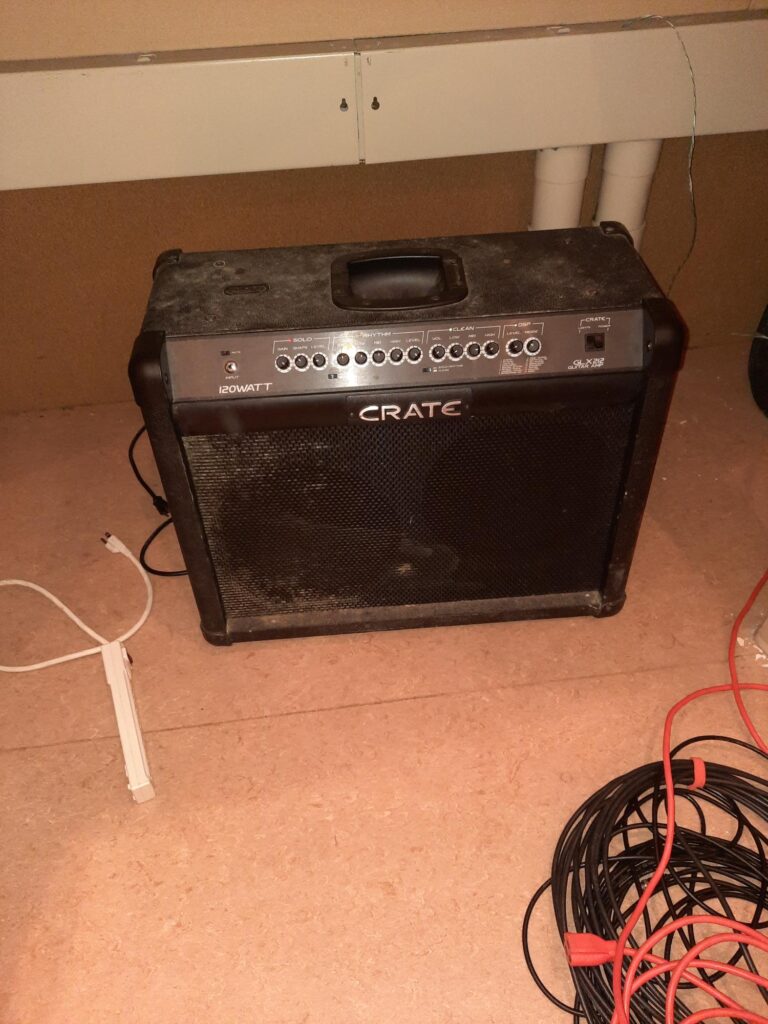
In fall 2022, the inside of the TV studio was 85 degrees Fahrenheit, and the humidity level was high at 70%. Binford has a hydrometer to measure the humidity in the room. The equipment in the TV and recording studios needs cool temperatures around 60 degrees Fahrenheit and the humidity level should be between 51% and 55%, according to risk management.
“It’s not really a usable facility if we’re pushing 90 degrees inside during the late fall,” said Binford.
According to director of Safety and Risk Management Jon Maddy, the cause of mold growth was a two-part system: a malfunction in the CAT building’s chiller system and a leak in the building’s steam supply line.
“The CAT building’s HVAC system consists of steam reheat coils which are used to control the relative humidity levels of the supplied air for the building. Steam was not readily available due to a leak in the building’s steam supply line that had to be isolated. Also, the building’s chiller system malfunctioned which is used to control temperature levels for the building. A combination of both systems allowed an increase in the building’s relative humidity and temperature levels which encouraged mold growth,” said Maddy.
Action and inaction taken
On Sept. 14, 2022, Binford and King notified their department heads of the mold.
Scott Eldredge, head of the communications department, reached out to the department of music and the dean of arts and college about the mold. Safety and Risk Management was then made aware of the issue.
On Sept. 16, 2022, Maddy conducted an inspection for mold and according to Binford, was very thorough using a blue light to show the mold that is invisible to the eye. Maddy recommended throwing away items with mold growth to prevent the mold spores from spreading.
King threw away furniture like chairs, a piano cover, a guitar case and some musical equipment from storage.
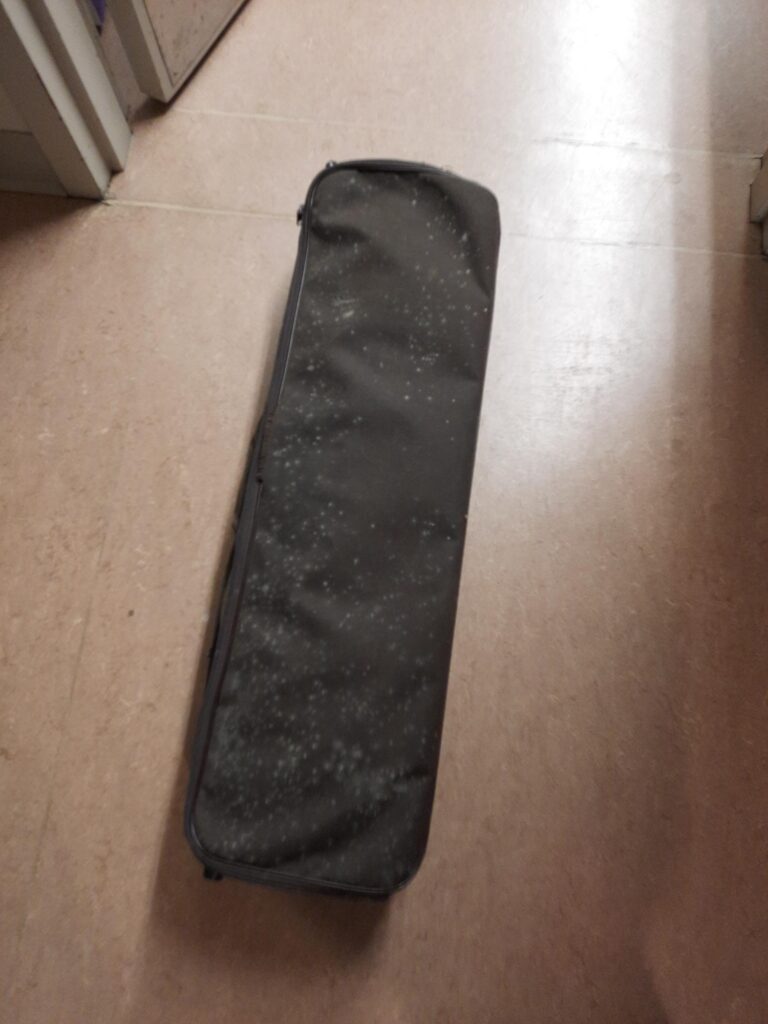
According to Maddy, the mold in the studios is not a health concern. Mold is harmful to TV and recording equipment and degrades it, resulting in it being trashed.
According to Binford, the TV studio uses Sony equipment that is rented out from the company. If the equipment is damaged, the communication department will have to pay a fine.
On Oct. 7, 2022, Eldredge sent an email summarizing Maddy’s findings. King and Binford were told by risk management that cleaning supplies and chemicals will be given to them to help clean some of the mold themselves.
Cleaning supplies and chemicals were never brought to King and Binford. On Dec. 20, King reached out to Risk Management to address the long wait for the cleaning supplies and chemicals first mentioned in October with no updates since then.
On Jan 20, 2023, Binford and King met with Risk Management to recap the mold situation. Maddy, upon approval of the university, reached out to Binford and King to offer an external cleaning company, Servpro restoration, to clean the studios for mold.
According to Mike Byers, Vice Chancellor of finance, the cost of a thorough cleanup by Servpro is $27,000 and is paid for by the Facilities management/maintenance budget.
On Jan. 27, a representative from Servpro, Shawn Bowls, inspected the studios and evaluated all the surfaces they will clean. The only thing that won’t be cleaned by Servpro is the technological surfaces. For the TV studio, Binford has not noticed any mold growth on technology. The mold is mostly on hard surfaces like the shelves inside the switcher board console of the TV studio.
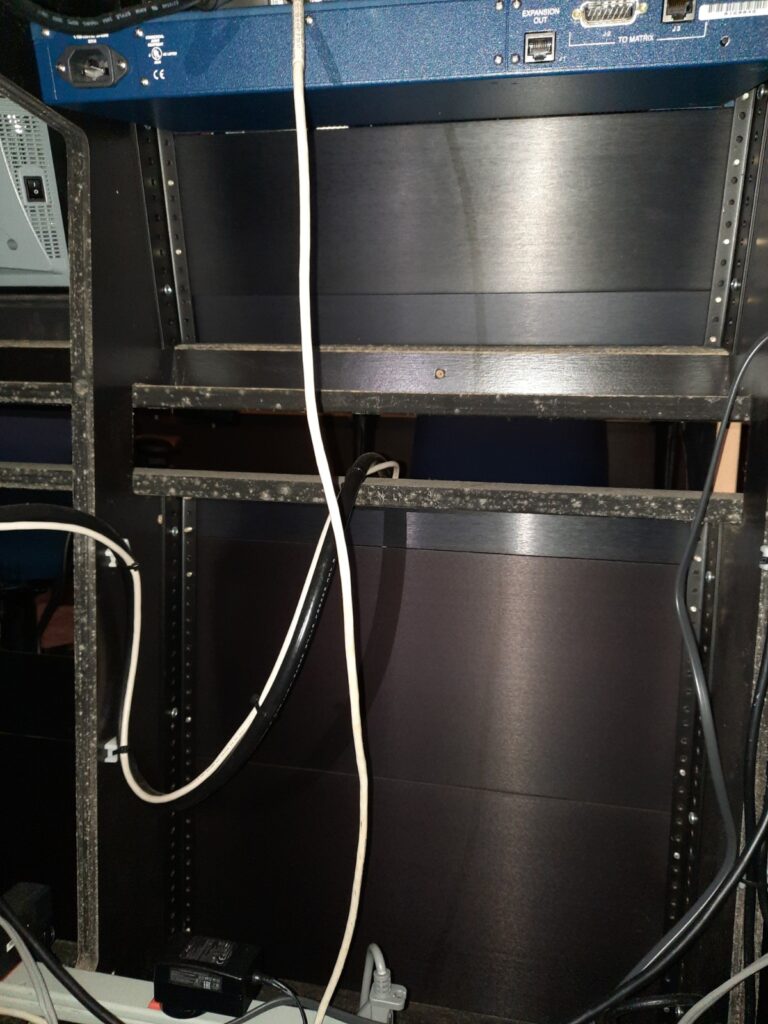
After the inspection, Servpro scheduled the cleaning between Feb. 5 and 11, but they have not reached out to King and Binford since then. During the last week of February, Maddy informed Binford and King that a day for Servpro to clean is being scheduled soon after spring break.
King’s thoughts on why Servpro is taking a while to schedule a cleaning is because they have other clients, and they don’t just clean mold. Binford thinks that mold is an issue all around campus, so their studio is not the only one being dealt with.
Not our job
The recording studio is not just a classroom; it is a facility that students can use outside of class, so King is concerned with scheduling issues. When Servpro comes in to clean, the place will have to be shut down, and he doesn’t want to reschedule students’ times to use the studio.
If they had cleaning supplies, King and Binford are willing to clean some of the surfaces themselves, but cleaning mold is not their expertise. They are not going to clean the space themselves and instead let the experts, Servpro, handle it.
“That’s not necessarily what either of us specialize in and that’s not to say that we’re not happy to do it, but at the same time, mold is not a normal upkeep of the space, but a special circumstance,” said Binford.
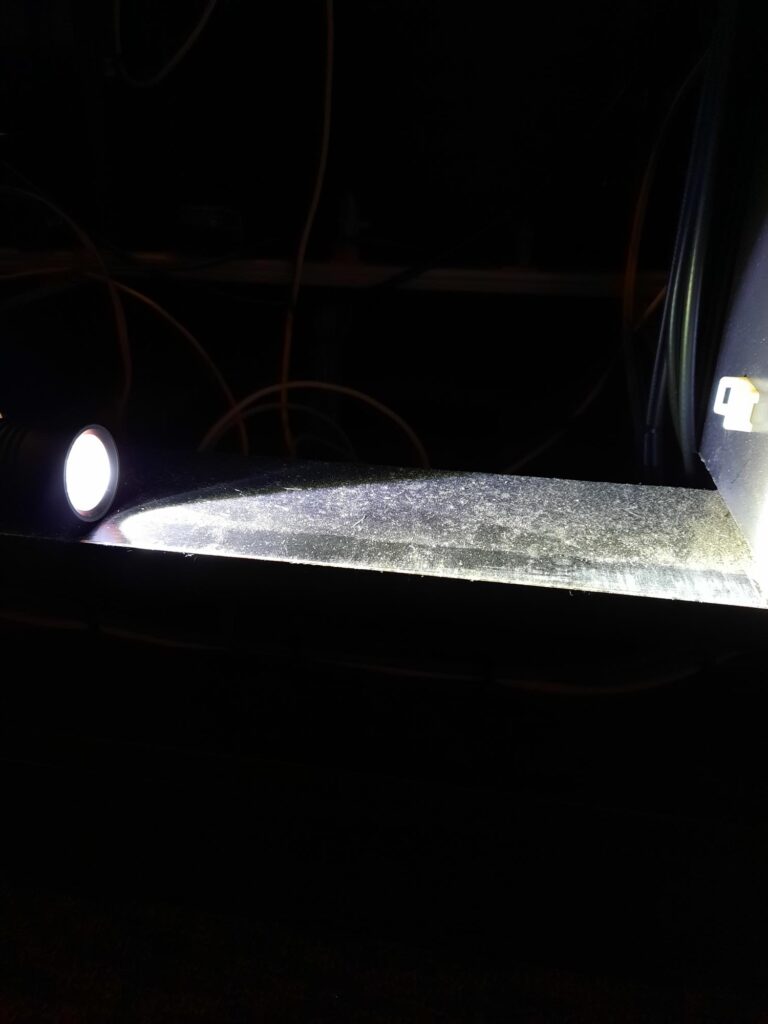
King was asked by the music department if the practicum students could clean the mold and he said no. Binford and King are fine with students using wet wipes to clean surfaces because that is basic Covid protocol and doesn’t require handling strong chemicals.
“We’ve been told that the mold isn’t dangerous or toxic, but I also don’t want my students or me to clean. I also don’t know the cleaning material,” said Binford.
King recalls when Covid-19 was worse, professors were given chemicals to clean and many of them got sick. “It makes you wonder,” said King.
King is immunocompromised with severe Asthma and Crohn’s disease, so he does not want to put himself at risk with cleaning.
According to King, Facilities management is short-staffed. Before Servpro was scheduled to come and clean, the mold problem would be up to Binford and King to deal with.
Binford and King have not noticed the mold worsening, but people are noticing the mold in the studios.
“It’s now not just internal, it’s outside people coming in to use the space. That’s where my concern is that they are going to think this is a neglected facility that we don’t care about. Well, we do care but we’re also trying to do it with supervision,” said King.
Binford and King are worried that if the mold is not cleaned in time, it will get worse when the seasons change, and temperatures increase.
Dehumidifiers
In August 2022, industrial dehumidifiers were brought over as a temporary fix to help bring the humidity to a relative level, according to Maddy. Two large dehumidifiers were put in the recording studio, and one was in the TV studio’s storage room.
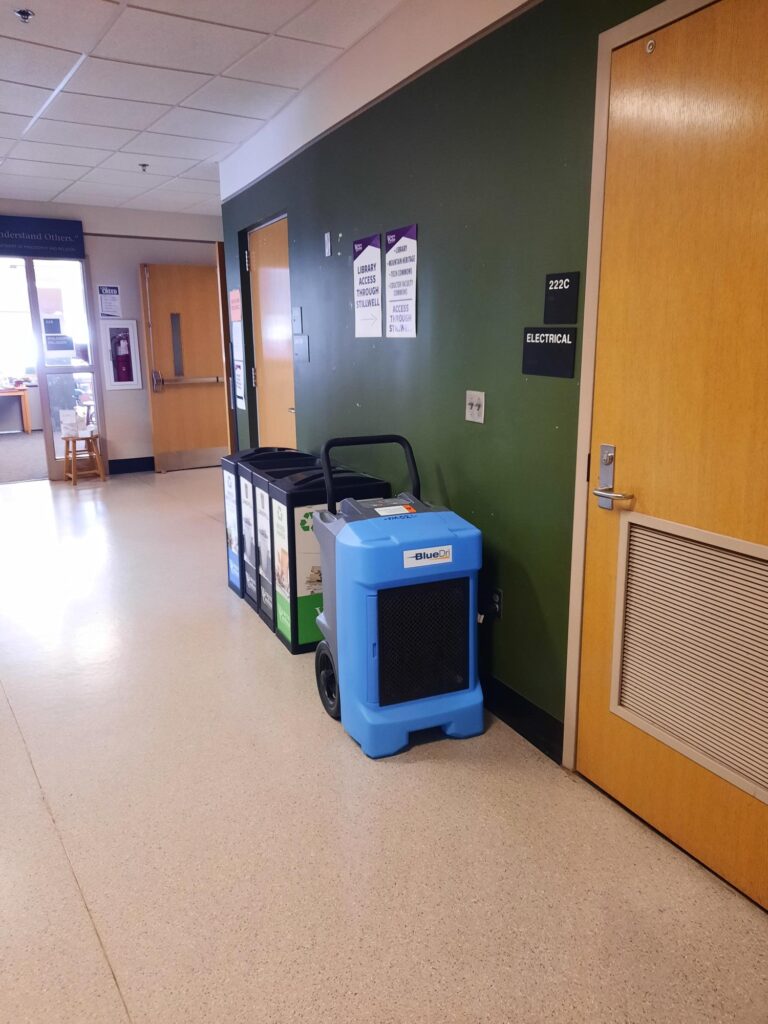
Industrial dehumidifier on the second floor of Stillwell. Photo by Ruby Annas. 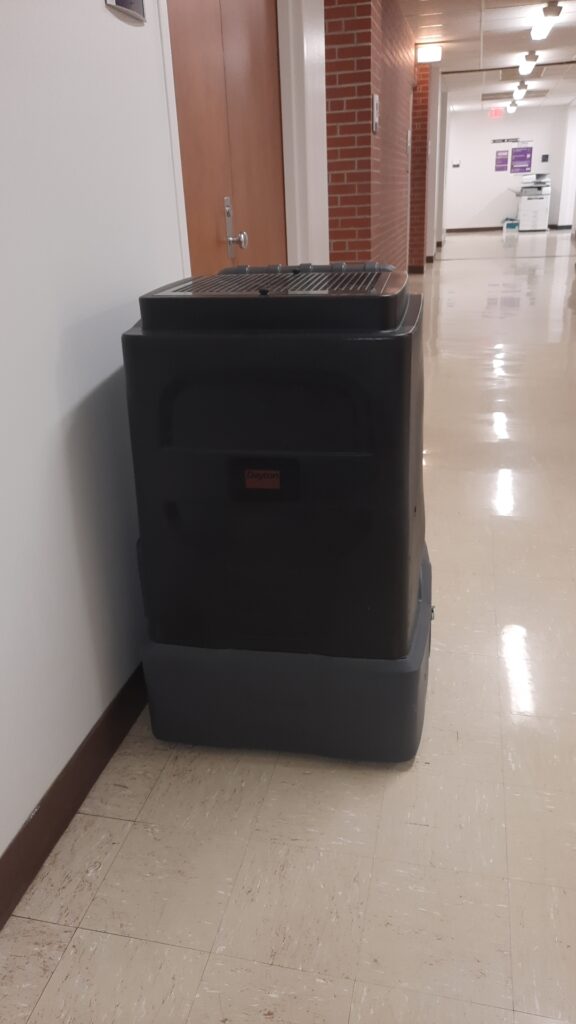
Industrial dehumidifier on the second floor of Killian. Photo by Ruby Annas. 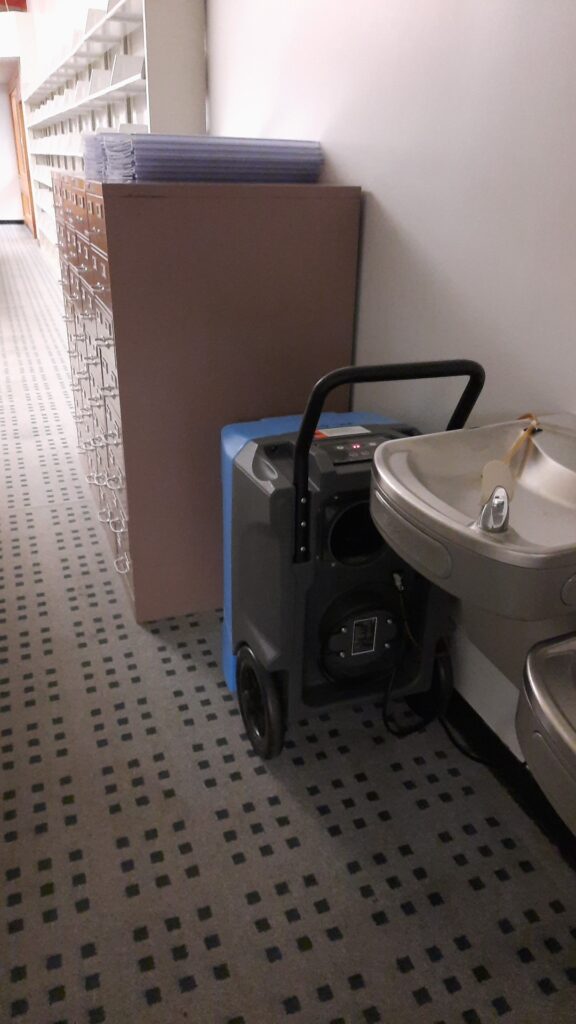
Industrial humidifier on the ground floor of the Hunter Library. Photo by Ruby Annas.
The dehumidifiers helped with lowering humidity, but also caused a few inconveniences. The dehumidifiers were noisy, very big and blocked walkways. It raised the temperature of the room, so King and Binford wouldn’t run them all the time.
“I don’t remember them (dehumidifiers) being all that effective,” said King.
After winter break, in December 2022, King requested for the dehumidifiers to be removed because the humidity levels were low and steady because of winter weather and the steam system was repaired.
Dehumidifiers are in other buildings on campus. In Stillwell, there are two dehumidifiers on the second floor, three in Killian, one on each floor, another in McKee and one on the ground floor of Hunter Library.


